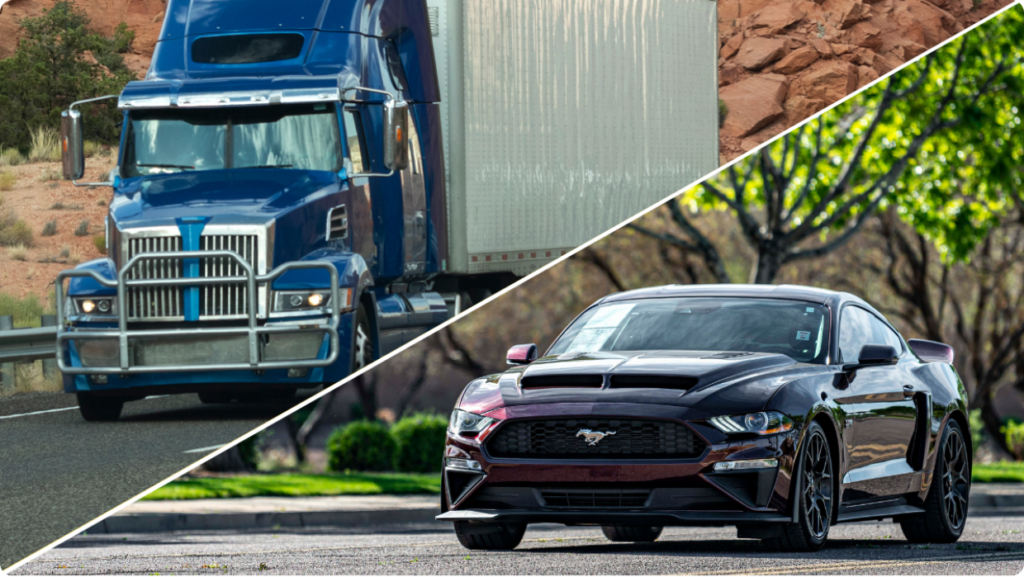Auto insurance is one of those necessary expenses we often don’t think much about — until there’s a need for it. But when it comes to choosing between commercial car insurance covered by business insurance and individual personal car insurance, things can get a bit confusing.
Many Guided Solutions customers come to us wondering, “Do I need both?” or “What’s the real difference between these policies?” Let’s break down the key distinctions so you can make sure your coverage fits your needs.
Personal vs commercial auto insurance
When choosing auto insurance, you’ll want to have the right coverage for how your vehicle is used. The distinction between personal and commercial auto insurance comes down to the purpose of the vehicle’s use. Selecting the appropriate insurance can protect you from costly legal and financial consequences should an accident occur.
Here’s a closer look at the differences and why it’s crucial to have the correct coverage:
What is personal auto insurance?
Personal auto insurance covers you for everyday driving activities. It is designed for individuals or families who use their vehicles for every day, non-business activities. Standard policies include liability coverage (protecting you if you’re at fault in an accident), collision coverage (covering damages to your vehicle), and comprehensive coverage (protecting against non-collision-related events like theft or weather damage). You can explore more about coverage options here.
You’ll want a personal auto insurance policy for typical day-to-day driving, such as:
- Driving to work or school
- Running errands like going to the grocery store
- Taking family vacations or road trips
- Commuting to your 9-to-5 job
What is commercial auto insurance?
Commercial auto insurance is a specialized type of insurance designed to cover vehicles used for business purposes. It provides protection for vehicles that are primarily used to conduct business activities, rather than personal use. This insurance is particularly important for businesses that own or operate vehicles as part of their daily operations.
Coverage typically includes:
- Transporting goods or making deliveries
- Driving to visit clients or attending business meetings
- Hauling equipment to job sites
- Operating vehicles for a business, like taxis, vans, or delivery trucks
It’s important to understand which type of insurance applies to your situation, as using a personal vehicle for business purposes could lead to coverage gaps if you’re not properly insured.
Who needs commercial auto insurance?
Commercial auto insurance is suitable for a wide range of businesses. Businesses involved in delivery services, transportation of goods, or even rideshare services will need commercial auto insurance tailored to their unique needs. It covers business-related risks that personal auto insurance doesn’t.
The types of businesses that typically need commercial auto insurance include:
- Construction Companies: Businesses using heavy-duty vehicles and equipment.
- Contractors: Professionals using vehicles to transport tools and materials to job sites.
- Delivery Services: Businesses that transport packages or goods.
- Emergency Services: Organizations providing emergency response services, including fire and rescue vehicles.
- Food Trucks and Mobile Businesses: Businesses operating food trucks or other mobile units.
- Fleet Services: Companies operating multiple vehicles, such as transportation or delivery companies. Fleet insurance can cover a range of vehicles under one policy.
- Healthcare Providers: Non-emergency medical transportation services or mobile health units.
- Landscaping and Lawn Care Services: Companies providing landscaping, lawn care, or other outdoor services.
- Public Transportation Services: Companies providing public transit, such as buses, shuttles, or vanpools.
- Real Estate Agents: Agents using their vehicles for showing properties and meeting clients.
- Rental and Leasing Services: Companies renting or leasing vehicles, including cars, trucks, or specialty vehicles.
- Retail Businesses: Businesses using vehicles for deliveries or other business operations.
- Towing Companies: Services using specialized vehicles for towing operations.
- Tourism and Travel Operators: Companies offering transportation for tours, sightseeing, or travel services.
- Waste Management Services: Companies handling waste collection and disposal.
That’s not an inclusive list by any means, and it can extend to business-owned vehicles and may even cover employees using their own cars for work purposes.

What does commercial auto insurance cover?
Commercial auto insurance offers more comprehensive protection compared to personal auto insurance. Here’s what’s typically covered:
- Liability: Covers damages or injuries caused by your vehicle during business operations.
- Collision and comprehensive: Protects against damage to business vehicles, whether due to accidents, theft, or natural disasters.
- Uninsured motorist and underinsured motorist coverage: Provides protection if, during business operations, your vehicle is involved in an accident with a driver who has no insurance or insufficient coverage.
- Hired and non-owned auto coverage: Protects your business when employees drive personal vehicles or rented cars for work purposes.
Also, some policy providers might extend their commercial auto insurance coverage to include:
- Medical payments coverage: This option helps cover medical expenses for you and your passengers after an accident, regardless of who is at fault. It can be crucial in businesses that transport passengers or employees.
- Cargo coverage: For businesses that transport goods, cargo coverage protects the items being shipped in case they are damaged or lost during transport. This is especially important for delivery services and logistics companies.
- Roadside assistance coverage: This provides help if a business vehicle breaks down on the road. Towing, tire changes, and fuel delivery are typical roadside assistance coverage.
- Rental reimbursement coverage: If a business vehicle is out of service due to an accident or damage, this coverage helps cover the cost of renting a temporary replacement vehicle.
- Custom equipment coverage: If your business vehicle is equipped with custom tools or accessories (like racks or special modifications), this coverage helps protect those additions from damage or theft.
Do I need both commercial and personal auto insurance?
In some cases, you might need both types of insurance to make sure you’re fully covered. If you use your vehicle for both personal and business activities — such as taking the kids to school and then making business deliveries — there are two main reasons to consider having both commercial and personal auto insurance: coverage gaps and legal/financial repercussions.
Coverage Gaps
Commercial auto insurance typically covers business-related activities but may have limitations when it comes to personal use. Common gaps include:
- Personal Liability Gaps: While commercial policies cover accidents occurring during business operations, they might not provide adequate protection for personal accidents, such as those that can happen while running errands or driving to the beach.
- Medical Payments Gaps: Many commercial policies do not extend medical coverage for personal use, which means you and your passengers may not be covered if injured during personal trips.
- Comprehensive and Collision Coverage Gaps: Coverage for non-business-related incidents might be excluded from commercial policies. Personal accidents could result in denied claims for vehicle repairs or replacement.
- Uninsured/Underinsured Motorist Coverage Gaps: If you’re involved in an accident with an uninsured or underinsured driver while using a commercial vehicle for personal reasons, coverage may be limited or unavailable, depending on your policy.
To avoid these gaps, you might need a personal auto policy in addition to your commercial policy, or a specialized endorsement to ensure comprehensive coverage for mixed-use vehicles. Make sure you discuss your specific needs with your agent to be fully protected.
Legal and Financial Implications
Not having the correct insurance coverage can lead to legal and money issues:
- Legal Penalties: Operating a vehicle that requires commercial insurance without proper coverage can result in fines, penalties, and potential license suspension. This can impact your business’s ability to operate legally.
- Liability Risks: Inadequate or incorrect insurance coverage might leave you personally liable for damages resulting from an accident. Without appropriate coverage, your business assets could be at risk, and you may face out-of-pocket expenses for damages, medical costs, and legal fees.
- Financial Losses: Insufficient insurance can lead to substantial financial losses, including costs for vehicle repairs, medical expenses, and legal claims. Personal insurance generally doesn’t cover business-related incidents, so you could be left to cover these expenses yourself.
- Insurance Claims Denial: If a vehicle used for business purposes only has personal auto insurance, claims might be denied if an accident occurs while using it for business. Insurance companies may refuse coverage for damages if the vehicle was used in a manner not specified in the policy, leaving you financially exposed. If you use your personal car to visit a client and get into an accident, it could lead to significant long-term consequences if you’re not properly covered.
- Business Interruption: Inadequate insurance can also result in operational downtime or disruptions, which in turn can affect revenue and reputation, especially if you are unable to fulfill client commitments or deliver goods as promised. Learn more about business interruption insurance.
How much does commercial auto insurance cost?
Generally, commercial auto insurance tends to be more expensive than personal auto insurance due to the higher risks associated with business-related driving. Several factors can influence the cost:
- Vehicle type: Larger vehicles or those transporting hazardous materials can increase premiums.
- Usage: How often and for what business purposes the vehicle is used will impact rates.
- Driving history: The driving records of both the business owner and employees play a role in determining the cost.
- Location of the business: Businesses operating in areas with higher accident rates, traffic congestion, or crime can expect to pay more for insurance.
- Distances driven in the course of doing business: Companies whose vehicles cover long distances or frequently travel through different regions may face higher premiums, as the exposure to risks increases with the amount of time spent on the road.
- Coverage limits and deductibles: Higher limits and lower deductibles will typically raise premiums but provide more robust protection.
Can I write off my commercial auto insurance?
For many businesses, commercial auto insurance premiums are considered a necessary business expense, making them tax-deductible. The IRS generally allows deductions for expenses that are “ordinary and necessary” for running a business, and this typically includes commercial auto insurance.
Tax Implications
To take advantage of available deductions, it’s important to keep detailed records of your business-related driving activities and insurance expenses. Deducting commercial auto insurance can help reduce your taxable income, resulting in lower overall tax liability for your business.
However, the deductibility depends on how the vehicle is used and documented. Only the portion of your insurance costs associated with business use will be deductible if the vehicle is used for both personal and business activities.
Here are some examples of when taxes come into play with commercial vehicles:
- Delivery Services: If you operate a delivery service, such as a catering company or a flower delivery business, and use a vehicle specifically for deliveries, the insurance premiums for that vehicle may be fully deductible as a business expense.
- Contractors and Tradespeople: A contractor using a truck to transport tools and materials between job sites — and also drive to and from home to those job sites — can deduct the insurance premiums for that truck as long as the vehicle is used primarily for business purposes, and not for personal reasons.
- Mixed-Use Vehicles: If you use your personal vehicle for business activities, such as visiting clients or job sites, you can deduct the portion of your commercial auto insurance that applies to your business usage. It’s crucial to keep detailed mileage logs to properly allocate business versus personal use.
Remember, maintaining accurate records of your vehicle’s business use is absolutely necessary for tax deductions. This includes keeping a log of miles driven for business purposes, detailed receipts, and records of insurance payments. Consult with a tax professional to make sure you’re complying with tax laws and make the most of all available deductions.
Get auto insurance quotes from trusted carriers with Guided Solutions
No matter what type of insurance you’re looking for, Guided Solutions is here to help you find the perfect coverage at the best price. Whether you’re insuring your personal car, a business fleet, or both, we’ll walk you through your options to ensure you’re fully covered. Ready to get started? Click here for personal car insurance, or click here if you need commercial auto insurance for your business vehicles.










